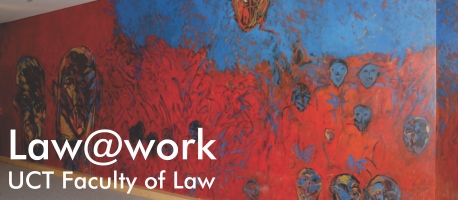
How does the law seek to stimulate and regulate creative expression?
Join this free course which explores the current law of copyright in South Africa; the impact of that law on art, entertainment, and industry; and the ongoing debates concerning how the law should be reformed, also in the context of artificial intelligence.
CopyrightX:UCT is a member of the CopyrightX Community, a network of affiliated courses offered by several universities and other institutions each year, originally developed by Harvard Law School. CopyrightX:UCT consists of the Harvard pre-recorded lectures, accompanied by reading materials relating to U.S. and South African copyright law. Weekly online seminars will more closely analyse South African copyright law. This course will be of interest to anyone concerned or faced with copyright law, including librarians, artists, publishers or law students.
Join us for this free weekly course which is more relevant than ever in light of South Africa's changing copyright law landscape.
When?
This course is not currently scheduled.
Check out our Course Overview page to see all our current courses. Or join our mailing list to stay up to date with newly-scheduled courses.
Course outline
Topic 1: The foundations of copyright law and fairness and personality theory
The system of multilateral treaties
Originality
The idea/expression distinction
Fairness theory
Personality theory
Topic 2: The subject matter of copyright
Literary works, musical works, artistic works, cinematograph films, sound recordings, broadcasts, programme-carrying signals, published editions, computer programs, and fictional characters
Topic 3: Authorship/ownership and welfare theory
Sole and joint authorship
Works for hire
The utilitarian framework
The incentive theory of copyright
Copyright in AI-generated works
Topic 4: The mechanics of copyright
The decline of formalities
Duration of copyright
Protective provisions
Topic 5: Economic and moral rights
The right of reproduction
The right of modification
The right of distribution
The right of public performances
The right of paternity
The right of attribution
Topic 6: Copyright exceptions and limitations
Fair use
Fair dealing
Enumerated permitted uses
Topic 7: Copyright infringement and cultural theory
Primary and secondary liability
Technological protection measures
Premises, implications, and supplements and concerns
Implications of AI technology
The cultural theory
Topic 8: Remedies and copyright, innovation and development
Equitable relief
Damages
Criminal penalties
Insights from research
Copyright reform
Who will benefit from this course?
Anyone concerned or faced with copyright law, in particular librarians, artists, publishers, law students, or anyone with a keen interest for copyright law.
Presenter
Dr. Tobias Schonwetter is an Associate Professor at the University of Cape Town where he directs the IP Unit and the iNtaka Centre for Law & Technology. He specialises in and teaches intellectual property and cyberlaw, particularly the relationship between intellectual property, innovation and development. Tobias is a board member of UCT Press and an Associate Member of the Centre of Law, Technology and Society at the University of Ottawa. He regularly advises government entities in South Africa. Tobias has co-led numerous research projects in the area of IP and IT law, including the Open AIR project. He was a Senior Manager at PwC, a Global Law Professor at KU Leuven and a Regional Coordinator for Creative Commons. Tobias has written numerous articles on intellectual property law and has spoken at various national and international conferences.
Hanani Hlomani is a tech law strategist, researcher, lecturer, consultant and a PhD candidate at the University of Cape Town. He is a research Assistant at the Intaka Centre for Law and Technology and a researcher at Research ICT Africa, where he explores the relationship between law and emerging technologies in Africa, focusing on Intellectual Property, Artificial Intelligence and data governance. His influential publications have made an impact for organisations like the African Union, Southern African Development Community, European Union, and African Economic Regional Consortium. Hanani frequently contributes op-eds to reputable publications, discussing the opportunities and risks of emerging technologies such as AI, especially for developing countries. In the last year, Hanani has spoken at events like the WIPO conversation on IP and frontier technologies, the African Internet Governance Forum and the Africa law tech Festival. He has also taught at the African School of internet Governance and facilitated training workshops for legal practitioners based on UNESCO’s Global Toolkit on AI and the Rule of Law for Judicial Actors in Africa.
How much?
Attending the course is free of charge!
Certificate
Two types of certificates can be obtained subject to the following requirements:
| Requirements | Attendance | Exam | Fee | |
| CopyrightX certificate from Harvard | Issued to all who pass the Harvard exam | 80% | Pass | n/a |
| Certificate of attendance from UCT | On request | 80% | n/a | R900 |
How to sign up
Applicants must provide a motivation of approximately 400 words stating why they want to participate in CopyrightX:UCT, and how they plan on utilising their knowledge afterwards. Furthermore, applicants must make a commitment to actively participate in the course and attend the weekly online seminars at the University of Cape Town.
Motivations must be emailed to Liesel.Collins@uct.ac.za by 22 January 2024. Additionally, applicants must complete and submit the registration form.
Applicants will be informed approximately one week before the course starts whether they have been successful.
Download the brochure.
